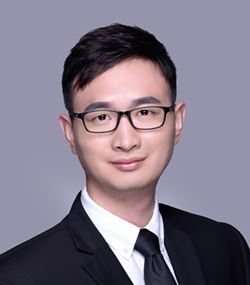
Prof. Baile CHEN
Associate Professor, School of Information Science and Technology, ShanghaiTech University
|
When III-V Photodiodes Meet AI: Enabling Miniaturized Spectrometers and Faster Optical Links
Abstract
III-V semiconductor photodiodes serve as fundamental components for optoelectronic systems, with AI technologies now unlocking unprecedented performance. In this presentation, I will highlight two transformative applications of III-V photonics: (1) chip-scale single-pixel spectrometers enabled by our novel p-Graded-n architecture, offering compact, intelligent spectral analysis for portable sensing applications, and (2) record-breaking uni-traveling-carrier (UTC) photodiodes achieving >220 GHz bandwidth - a milestone that empowers next-generation AI optical interconnects with unprecedented data speeds. Together, these advancements demonstrate how the fusion of III-V photonics and AI is driving simultaneous breakthroughs in miniaturized spectroscopy and ultra-high-speed optical communications, opening new frontiers for smart sensing and computing systems.
|
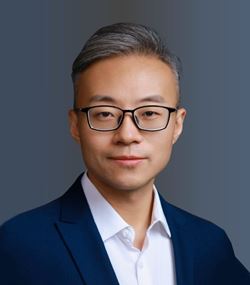
Prof. Ran CHENG
Associate Professor, Department of Computing & Department of Data Science and Artificial Intelligence, The Hong Kong Polytechnic University
|
EvoX: Evolutionary Computation as the Engine of Scientific Discovery
Abstract
As AI for Science advances, researchers are increasingly facing problems that lack explicit structure, exhibit black-box behavior, and offer little prior knowledge, thereby making them difficult to analyze, model, or optimize using conventional approaches. These challenges arise across a wide range of domains, from physics and engineering to biology and materials science. In this talk, I will introduce EvoX, an open-source platform built to support evolutionary algorithms—a family of population-based search methods inspired by natural evolution. Unlike traditional machine learning techniques that often require large datasets or clear gradients, evolutionary computation excels in exploring complex, non-differentiable, and data-scarce problem spaces, making it particularly suitable for many scientific applications. EvoX provides a high-performance computational backend that allows these algorithms to scale efficiently and be applied to large, high-dimensional design problems. I will showcase its application in supercritical airfoil design to illustrate how evolutionary approaches can enable intelligent search in domains where conventional methods often fail.
|
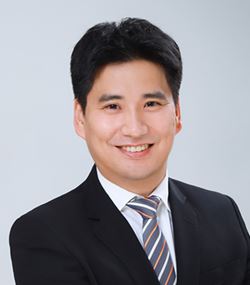
Prof. Shinhyun CHOI
Associate Professor, School of Electrical Engineering, Korea Advanced Institute of Science and Technology
|
Development of Reliable Emerging Memory Devices and Future Perspectives
Abstract
Artificial intelligence (AI) will enable machines to think and solve complex tasks like human beings. In recent years, artificial neural networks have improved recognition and classification accuracy. However, state-of-the-art deep learning algorithms require large network models with multiple layers, which pose significant challenges for complementary metal-oxide-semiconductor (CMOS) implementation due to limitations in conjoining computation, memory, and communication requirements in large networks. As an alternative hardware platform, emerging memories have been proposed for weight storage and fast parallel neural computing with low power consumption. The parallelism property of the crossbar arrays for matrix-vector multiplication enables significant acceleration of core neural computations. In this talk, Prof. Choi will present a systematic study on the fundamental understanding of emerging memory devices (RRAM and PRAM). He will talk about the approach how to achieve highly reliable artificial neurons and synapses for neuromorphic computing which can be a key step paving the way towards post von Neumann computing. In addition, he will also introduce the application of developed crossbar network, which suggests potential applications of emerging memory/computing device-based network to effective data processing for solving real-world problems. He will also talk about his recent work on phase change memory that shows low power consumption with cheap fabrication process.
|
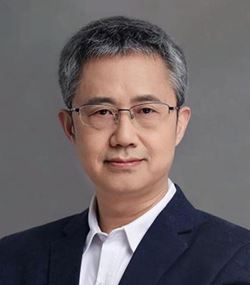
Prof. Tiejun CUI
Professor, Department of Electromagnetics and Microwave Technology, Southeast University
|
AI for InfoMeta and InfoMeta for AI
Abstract
In this presentation, I firstly introduce the concept and principles of information metamaterial (InfoMeta), and its relation with artificial intelligence (AI). Through digital coding representation, InfoMeta makes metamaterials be evolved from passive to active and from analog to digital and fuses the electromagnetic space and digital space. InfoMeta has three key features: 1) controls the electromagnetic waves in real time and in programmable way, fostering reconfigurable intelligent surface (RIS) technology and establishing a new paradigm for 6G intelligent programmable wireless environments; 2) controls the electromagnetic waves and processes digital information simultaneously, laying the foundation for electromagnetic information theory and developing new architecture for low-power wireless systems; and 3) is easy to integrate with AI technologies. I will present more details on how AI algorithms are used in InfoMeta to conduct intelligent and smart tasks, and how InfoMeta improves the AI technologies to build up intelligent systems and large electromagnetic models.
|
|
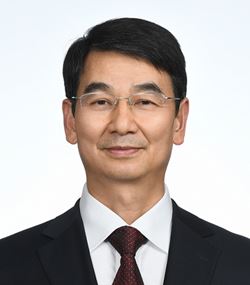
Prof. Wanlin GUO
Chair Professor in Mechanics and Nanoscience, Institute of Nanoscience, Nanjing University of Aeronautics and Astronautics
|
Energizing Intelligence
Abstract
Nature is always the best teacher for us to find better way to solve the problem. The intelligence of the living things is to survive by harvesting energy from the environment. Even the unicellular organism formed between 3.5 billion and 4.1 billion years ago in water can energize their intelligence through photosynthesis, metabolism and recently found hydrovoltaic effects. The currently widely applied artificial neuron network based AI is inspired by the finding of neuron system in our brain more than one century ago. In sharp contrast to the energy hunger data center to support AI applications, we find that our brain can store huge information at 1018 Bytes and process them at 1018 floating point operations per second, equivalent to 78,000 latest generation Graphics Processing Units, but at the least energy consumption only 1.26 times of the theoretical limitation.
What is the scientific mechanism of the energy efficient biosystem and brain? What can we learn from it to create the next generation technology for neuron morphology computation in Memory? This talk will discuss these issues with the most cutting-edge advances.
|
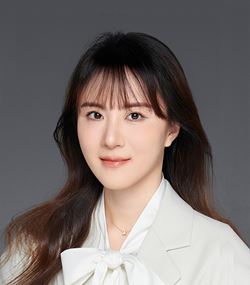
Prof. Suting HAN
Associate Professor, Department of Applied Biology and Chemical Technology, The Hong Kong Polytechnic University
|
Self-powered Memristor for Biomimetic Sensory Computing
Abstract
Anemotaxis behaviors inspired by rats have tremendous potential in efficientlyprocessing perilous search and rescue operations in the physical world, but there is still lack of hardware components that can efficiently sense, encode, and recognize wind signal. Here, we report an artificial vibrissal system consisting of a self-powered carbon black sensor and threshold-switching HfO2 memristor. By integrating a forming HfO2 memristor with a self-powered angle-detecting hydro-voltaic sensor, the spiking sensory neuron can synchronously perceive and encode wind, humidity, and temperature signals into spikes with different frequencies. Furthermore, to validate the self-powered artificial vibrissal system with anemotaxis behavior, a robotic car with equipped artificial vibrissal system tracks trajectory toward the air source has been demonstrated. This design not only addresses the high energy consumption and low computing issues of traditional sensory system but also introduces the multimode functionalities, therefore promoting the construction of neuromorphic perception systems for neurorobotics.
|
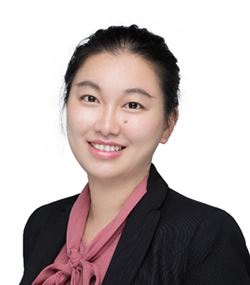
Prof. Jing LI
Associate Professor, Department of Computing, The Hong Kong Polytechnic University
|
From Words to Actions: The Pathway to NLP-Driven Embodied AI
Abstract
Natural Language Processing (NLP) has evolved from addressing isolated tasks to building unified language representations, transforming how machines understand, generate, and reason about language and even knowledge. This talk highlights key milestones in NLP’s evolution, with a focus on the rise of large language models (LLMs) and the state-of-the-art Retrieval-Augmented Generation (RAG) paradigm. We will explore the potential of LLMs as a cornerstone for Embodied Artificial Intelligence (Embodied AI)—systems that integrate perception, reasoning, and action seamlessly. While LLMs have begun to shape the early landscape of “thoughts,” they face significant challenges in grounding these capabilities in physical environments and translating knowledge into actionable behaviour. Looking ahead, this talk will discuss future directions for system-level NLP in Embodied AI, including multimodal integration, scalable deployment, and human-centred intelligence. By bridging the gap between words and actions, NLP is set to drive the next frontier of interactive and Embodied AI.
|
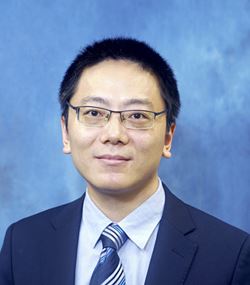
Prof. Jizhou LI
Vice-Chancellor Assistant Professor, Department of Electronic Engineering, The Chinese University of Hong Kong
|
Computational Microscopy for Advanced Battery Characterization
Abstract
The rapid evolution of battery technologies is driving the demand for deeper and more precise characterization methods to unravel the complex mechanisms governing battery performance and degradation. X-ray microscopy has become an indispensable tool for non-destructive, high-resolution investigation of battery materials and architectures, enabling visualization of internal structures, interfaces, and dynamic processes during operation. However, conventional techniques face significant challenges in data reduction, analysis, and interpretation for specific tasks, requiring advanced computational methods to enhance their capabilities. In this talk, I will introduce our recent work on developing computational microscopy techniques and their applications in advanced battery material characterization. By creating synergy between X-ray microscopy, advanced computing, and scientific discovery, these advances could enable us to gain unprecedented insights into the evolution of materials within electrodes, ultimately driving technological innovation in battery materials science.
|
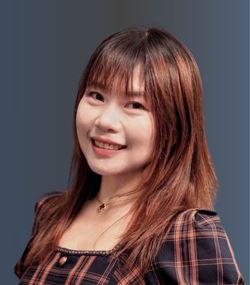
Prof. Wanyu LIN
Assistant Professor, Department of Computing & Department of Data Science and Artificial Intelligence, The Hong Kong Polytechnic University
|
Toward Interpretable Deep Learning for Molecular and Materials Science
Abstract
Molecular and materials science lie at the heart of solving critical global challenges, from advancing healthcare and energy sustainability to driving environmental protection and next-generation technologies. Key application areas such as drug discovery, energy storage, carbon capture, catalyst development, and semiconductor innovation showcase the transformative potential of these fields. Central to these advancements is the intricate design and analysis of molecular and material systems, where traditional experimental and computational approaches are now being revolutionized by deep learning methodologies.
While deep learning excels in modeling complex chemical and physical phenomena, its "black-box" nature often hinders its ability to provide actionable scientific insights. This presentation focuses on the pivotal role of interpretability in deep learning. By fostering trust in predictions and enabling the extraction of meaningful mechanistic insights, interpretable frameworks empower scientists to uncover new principles and accelerate discovery systematically.
|
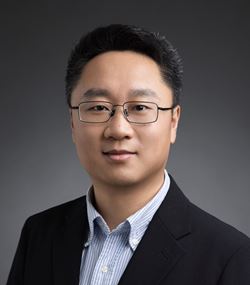
Prof. Quanhua MU
Assistant Professor, Department of Applied Biology and Chemical Technology, The Hong Kong Polytechnic University
|
Decoding cancer evolution with big data and AI for precision medicine
Abstract
Cancer remains the leading cause of human death. Recent developments have significantly improved patient prognosis, but the tumor cells keep evolving under treatment, leading to drug resistance and disease progression. Our prior work developed computational methods to track molecular evolution in brain tumors and uncovered novel therapeutic targets and resistance mechanisms. Recently, we focused on osteosarcoma, the most common primary bone cancer in children and adolescents. By integrating single-cell and multi-omics analyses, we characterized osteosarcoma’s spatiotemporal heterogeneity, identifying four distinct cellular states linked to unique gene regulatory networks, tumor microenvironments, and treatment responses. To address data integration challenges, we developed scPoly, a single-cell foundation model that excels in batch effect correction and cell type annotation. Leveraging scPoly, we created OSpaedia.org, a comprehensive osteosarcoma data platform. These AI-driven innovations demonstrate the power of computational approaches in advancing biomedical discoveries and precision cancer medicine.
|
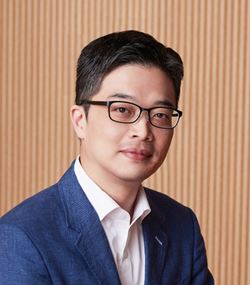
Prof. Wooyoung SHIM
Professor, Department of Materials Science and Engineering, Yonsei University
|
Ion transport within van der Waals crystals
Abstract
The force–flux relationship provides a foundational framework for understanding mass transport under non-equilibrium conditions. Governed by the Onsager reciprocal relations, it captures how gradients in chemical potential—such as concentration, temperature, and electric potential—drive the transport of mass, heat, and charge, including their coupled cross-effects. In this presentation, I will discuss voltage-driven ion transport and its strong dependence on the characteristics of the diffusion medium. Particular emphasis will be placed on layered materials with van der Waals (vdW) gaps, which offer low energy barriers for ion migration. These vdW architectures present promising opportunities for applications across semiconductors, metals, and insulators, including their use in memory elements, switching devices, and ion-selective membranes.
|
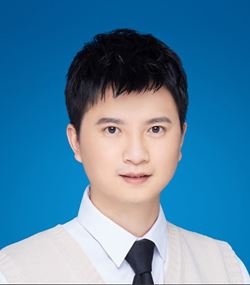
Prof. Zhong SUN
Assistant Professor, Institute for Artificial Intelligence, Peking University
|
Modern Analog Computing for Artificial Intelligence: Inference and Training
Abstract
Modern analog computing with resistive memory (memristor) crossbars has emerged as an energy-efficient accelerator for neural network inference, mapping weights to conductances and performing parallel matrix-vector multiplications in a single time step. Building on this foundation, we extend analog computing to AI training. Closed-loop feedback circuits combining resistive memory crossbars with op-amps enable one-shot solutions to linear and least-squares systems, supporting on-chip matrix inversion, Fisher-information pre-conditioning, and other key operations for second-order optimization. A bit-sliced iterative refinement loop achieves full FP32 (24-bit fixed-point) accuracy for high-precision updates. To scale up, a block-matrix (BlockAMC) decomposition connects multiple sub-arrays without reprogramming, supporting large-model training. Measurements on foundry-fabricated 1T1R chips demonstrate up to 100× speed and energy improvements over GPUs at equal precision, paving the way for unified analog engines that integrate inference and training on the same resistive memory fabric.
|
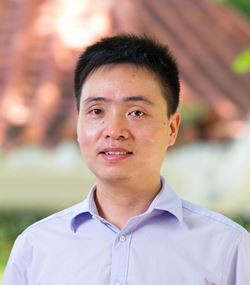
Prof. Chaoliang TAN
Associate Professor, Department of Electrical Engineering and Department of Biomedical Engineering, City University of Hong Kong
|
Two-Dimensional van der Waals Heterostructure-Based Memory Devices for Neuromorphic Computing
Abstract
This presentation introduces advancements in neuromorphic computing enabled by van der Waals (vdW) heterostructures. The research team, led by the PI, has leveraged the superior electronic and optoelectronic properties of Te/Se to design and fabricate a variety of advanced memory devices. These include electronic/optoelectronic memory devices using a Te/h-BN/Gr/CIPS vdW heterostructure, floating-gate memory devices with a MoS2/h-BN/Te vdW heterostructure, and photoinduced memory devices featuring a MoS2/h-BN/Se vdW heterostructure. These devices are designed for neuromorphic computing applications, such as reservoir computing at the optical communication band, multimodal reservoir computing, and in-sensor compressing. Additionally, the team has also explored a range of engineering techniques, such as phase and defect engineering, to facilitate the fabrication of advanced flash memory devices using a MoS2/h-BN/1T′-MoTe2 heterostructure, and reconfigurable memory devices with a MoS2/CIPS heterostructure for multifunctional neuromorphic computing tasks. This promising progress underscores the opportunities of vdW heterostructure-based multifunctional memory devices in advancing neuromorphic computing.
|
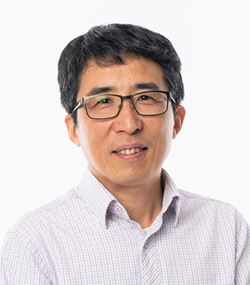
Prof. Lianzhou WANG
Chair Professor of Global STEM, Department of Applied Biology and Chemical Technology, The Hong Kong Polytechnic University
|
Can Machine Learning Help Design Better Semiconductor Materials for Solar Energy Conversion?
Abstract
Semiconductor nanomaterials hold the keys for solar energy conversion and storge systems like catalytic reactions for solar fuel production, low-cost solar cells, and rechargeable batteries. In this talk, we will give a brief overview of our recent progress in designing semiconductor nanomaterials for photoelectrochemical hydrogen generation and greenhouse gas conversion, low-cost solar cells with record-breaking efficiencies. Our journey in using machine learning to guide the selection of new dopants in semiconductor nanomaterials for photoelectrochemical water splitting showcases the potential of ML-powered material design strategy, which identifies the key parameters in dopant selection for transition metal oxide based photoelectrodes to achieve efficient charge separation and transport in water splitting reactions. The new findings could lead to anew avenues for ML-guided material development towards renewable energy conversion and storage technologies.
|
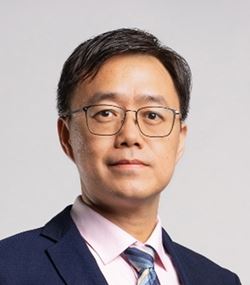
Prof. Qijie WANG
President Chair Professor, School of Electrical and Electronic Engineering & School of Physical and Mathematical Sciences, Nanyang Technological University
|
Two-dimensional Mid-Infrared Sensor Enabling Simultaneous Perception and Encoding, and Hyperspectral Imaging
Abstract
It is becoming increasingly important to perceive, convert, and process a massive amount of data efficiently. However, the realization of these key functionalities, i.e. data perception, conversion, and processing, currently relies on a cascade of discrete modules including detectors, convertors, and processors, making the system bulky and inefficient. Here, assisted by machine learning, we present retina-inspired two-dimensional (2D) optoelectronic sensors based on 2D van der Waals (vdWs) heterostructure that can perform the data perception and conversion simultaneously, in the mid-infrared (MIR) regime, an important frequency band for night vision, sensing, spectroscopy, and free-space communications.
|
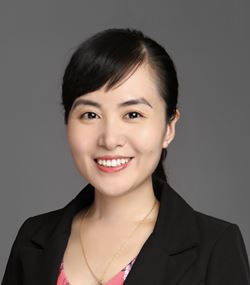
Prof. Hongxia YANG
Associate Dean (Global Engagement), Faculty of Computer and Mathematical Sciences, The Hong Kong Polytechnic University
|
Collaborative Generative AI (Co-GenAI)
Abstract
Generative AI (GenAI), including LLMs, MLLMs, and Stable Diffusion, is revolutionizing fields like healthcare, entertainment, and design. The market is projected to grow at 46.47% annually, reaching US$356.1 billion by 2030. However, centralized GPU limitations hinder broad participation in model pretraining. To address this, we propose Co-GenAI—a decentralized, collaborative system that integrates hundreds of domain-specific models into a unified foundation model. Key innovations include: (1) Domain-Adaptive Continual Pretraining (DACP) for low-resource, domain-specific learning; (2) a scalable model-merging infrastructure leveraging high-quality inputs and ranking algorithms; and (3) an open platform for real-world deployment. This framework outperforms top models like Qwen2.5, LLaMA3.2, and Phi-4 across 11 benchmarks in reasoning, coding, and math, achieving ~10% average accuracy increament. Co-GenAI enables broader access, fosters inclusive development, and drives cross-disciplinary GenAI innovation.
|
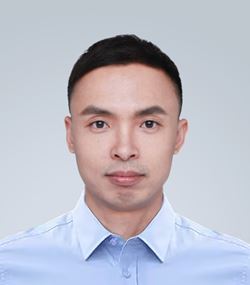
Prof. Ming YANG
Assistant Professor, Department of Applied Physics, The Hong Kong Polytechnic University
|
A Physics-Informed Cluster Graph Neural Network Enables Generalizable and Interpretable Prediction for Material Discovery
Abstract
Machine learning (ML) plays a pivotal role in the development of functional materials. However, achieving efficient, robust and interpretable predictions remains challenging due to the limited integration of domain knowledge. In this talk, I will introduce our proposed leveraging short-range atomic interactions of materials through a cluster graph representation to improve performance. This physics-informed cluster graph neural network (CG-NET) significantly enhances computational efficiency through a cluster sampling strategy. Importantly, by incorporating pseudo nodes as neighbors to the nodes at the cluster boundaries, we can maintain the coordination environment, ensuring prediction accuracy. I will further demonstrate CG-NET’s remarkable prediction accuracy and efficiency across diverse material systems and properties and reveal its superior interpretability and generalizability with extensive experiments. Our work highlights the importance of integrating domain-specific scientific knowledge into the design of a generalizable and interpretable ML framework.
|
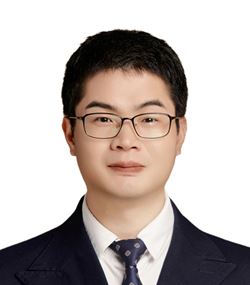
Prof. Zongyin YANG
Qiushi Distinguished Professor, College of Information Science and Electronic Engineering, Zhejiang University
|
Toward Next-Generation Spectral Detection: A Miniaturized High-Performance Solution
Abstract
This presentation highlights the groundbreaking development of miniaturized, high-performance spectrometers driven by advanced computational strategies. We present a series of breakthroughs from our research group, including the world’s smallest spectrometer, the world’s most efficient spectrometer, and the world’s cheapest spectrometer. We will discuss how these novel devices are being deployed in critical real-world applications such as defect inspection in solar power plants, non-invasive glucose monitoring, and light source detection in optical communication systems. The talk will conclude with future perspectives on AI-driven spectral sensing and its transformative potential across scientific and industrial domains.
|
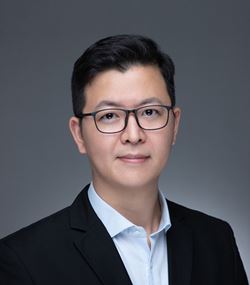
Prof. Jun YIN
Assistant Professor, Department of Applied Physics, The Hong Kong Polytechnic University
|
Computational Insights into Degradation and Phase Segregation in Hybrid Perovskites using Machine Learning Potentials
Abstract
I will present our recent advances in developing machine learning potentials (MLPs) for investigating hybrid perovskite materials, with a particular emphasis on how surface orientation and chemical composition influence surface and phase stability. By integrating MLP-enhanced molecular dynamics simulations, we achieve large-scale, long-timescale modeling of the FAPbI3/water interface. These simulations reconcile previously conflicting experimental observations and provide a quantitative basis for understanding the degradation mechanisms of hybrid perovskites. Additionally, we examine the structural heterogeneity arising from mixed A-site cation distributions in Cs0.5FA0.5PbI3. We introduce a new structural description (i.e., heterogeneity coefficient) that captures the spatial distribution of cations. This descriptor effectively predicts organic cation rotation and octahedral distortion, both of which are critical to the electronic properties of heterogeneous perovskites. Our findings establish fundamental structure-stability relationships and offer a predictive framework to guide the rational design of more stable hybrid perovskite materials for next-generation photovoltaic applications.
|
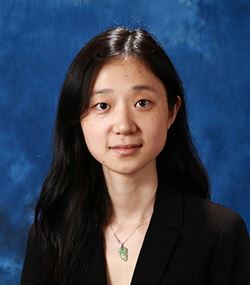
Prof. Ni ZHAO
Professor, Department of Electronic Engineering, The Chinese University of Hong Kong
|
Advancing Wearable Health Monitoring with Miniaturized Optoelectronics and Physiological Modeling
Abstract
The integration of advanced optoelectronic devices into wearable and contactless health monitoring systems is revolutionizing remote healthcare, particularly for aging populations managing chronic conditions like cardiovascular diseases. This talk highlights the development of a microsized optical spectrometer based on photomultiplication-type organic photodetectors, capable of bias-tunable spectral response and computational light reconstruction. With a footprint of just 0.0004 cm² and sub-5-nm resolution, this spectrometer eliminates the need for bulky optics, offering unparalleled miniaturization, scalability, and cost-efficiency for sensor arrays in wearable diagnostics. In the second part, I will introduce physiological models that transform sensor outputs into actionable health data. Notably, the multi-wavelength photoplethysmography (PPG) technology sets a benchmark for cuffless blood pressure monitoring. Complementing this, the systemic reflection coefficient model translates optical data into cardiovascular parameters, enabling comprehensive disease assessment. Together, these innovations promise to redefine non-invasive, real-time health monitoring.
|
































